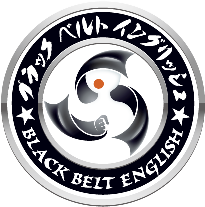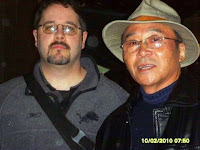How was Black Belt English created?
After deciding to teach my martial arts classes in English, I went to a local activity center and applied for a job to teach karate-do. The business looked over my resume and the interview seemed to go well, so it wasn’t long before I was contacted and informed I would be allow to start teaching a class there in July of 2008. Excited about my first opportunity to teach martial arts in Japan, I began forming my lesson plans.
July 13, 2008 was a red letter day for me. This was the day I started teaching karate-do in Japan, taking my first big step in making my dream come true. To my surprise, I found that most of the students present for the class were interested in learning karate-do more than English. This was good news to me, as I wanted the lesson to be focused on martial arts more than English. I simply wanted English to be a tool for communication – and for karate-do to be the heart of the lesson.
In time, my wife finished her contract at the study abroad center and we moved back to her family’s house (which was a better environment for our young son). Taking our savings from the bank, we invested the money in remodeling the small old house that stood next door. After a few months, we finally had the dojo (training hall) completed!
But what was I going to teach? Was I only going to teach martial arts?
This caused me to take some time and look over things a bit more carefully. I was an accomplished martial artist…I also had experience as an English teacher…I had been a college teacher and administrator…and I even had some of my creative writing material published in the gaming industry. Well – what did I enjoy doing? I loved teaching martial arts with a passion…I deeply enjoy communicating with Japanese people…and in my free time I enjoy strategy games of all kinds. How could this all fit together?
At this point I looked at my wife and thought about her accomplishments. She is fluent in English to the point she sounds like a native speaker and she even earned her college degree in the USA. She had come to the United States as a teenager to study English; but she ended up learning English by going to Cosmetology (beauty) school rather than ESL class (English as a Second Language). By deeply immersing herself in an activity she was interested in learning – but that required English language communication – she basically learned two things at the same time! She learned valuable skills – while communicating in English!
This gave me the inspiration to form the business around the activities that I enjoyed and had experience with. I would offer classes focused on an activity – and I would use English as the method of communication!
I would teach karate-do in English…I would play interesting games in English…I would offer college-like lectures in English (with advice and assistance about studying abroad)…And I would communicate with Japanese people in English (conversation classes).
I then needed to come up with a name. This required some careful thought. Action English! …That was already taken. English in Action! … No…Karate in English!... Well, I am offering more than just karate lessons…Black Belt English! Yeah!! When you achieve a black belt, you become an expert at something! Let’s call the business Black Belt English because students may be striving for a black belt in karate class or they may be trying to become experts in communicating in the English language!
Black Belt English …….. With its multiple-meanings, it sounded good to me.











